
Engaging Hearts and Minds in a Broken Culture
This discussion offers a preview of Volume #16 “Cultures in Conflict” from the That The World May Know video series, available below.
Home » Episodes » Focus on the Family Broadcast » A Fascinating Perspective on Racial Issues (Part 1 of 2)
Excerpt:
Dr. Shelby Steele: I think that the breakdown of the black America family is the single worst and most overwhelming problem we face today, bar none. Our problem is- is the decline of our family life.
End of Excerpt
John Fuller: That’s Dr. Shelby Steele, and he’s our guest today on Focus on the Family, sharing some unique perspectives on racial issues in our culture. And I think you’re gonna find this really interesting, and I do hope you’ll stay with us for this important conversation. This is Focus on the Family, with your host, Focus president and author Jim Daly, and I’m John Fuller.
Jim Daly: John, racial injustice is a real hot button topic in the culture today, with the unrest and all the things that have occurred over the years. Including the death of George Floyd in 2020, Michael Brown in 2014, and others. Those and other incidents have led to violence, unfortunately. And then, we try to find out how we got here, and search for solutions. And that cycle seems to repeat itself over and over again. Uh, the Bible tells us as Christians that we’re called to love our neighbors as ourselves, and treat others with dignity, because we’re all created in God’s image. And we take that very seriously here at Focus. Uh, that’s a command right from the Lord. And I thought it would be good to look at what’s happening in our culture and hear what some of the thought leaders are thinking about. And I know that some of this discussion will be controversial, and not everyone will agree with what Dr. Steele has to share. But I think it’s important for us to hear his insights on racial tensions in this country, and it will expand your thinking, I believe. He’s experienced racism growing up on the south side of Chicago, but he’s chosen to move beyond it. And hopefully he’ll offer advice to help our country, uh, move in a more positive direction as well.
John: And Dr. Steele is a Senior Fellow at the Hoover Institution, specializing in the study of race relations, and multi-culturalism and affirmative action. He’s an accomplished author and he created a new video documentary called, What Killed Michael Brown? And of course, referring to the 2014 shooting death that you mentioned Jim. And the documentary forms some of the basis for our conversation today.
Jim: Dr. Steele, welcome to Focus on the Family.
Dr. Steele: Well, thank you so much for having me.
Jim: Very excited to talk with you. I do see you as a thought leader. Uh, sometimes, uh, people may think of you as controversial, I think you’re just one of the many voices. But a very reasoned voice, a logical voice in this issue of racial tension. Before we get into that, uh, debate and that discussion, let’s go back and talk about your upbringing. And let’s talk about where you come from, your mom and dad, et cetera. Tell us a bit about who you are.
Dr. Steele: Well, uh, my mother and father, um, met and married in the very early Civil Rights movement in Chicago, the early ’40s. Uh, they were founding members of CORE, Congress of Racial Equality, which, uh, grew into probably the- the- the most, uh, the central Civil Rights movement. The movement that- part of the movement that focused on the Gandhian philosophy of passive resistance and so forth. So, I grew up in that- uh, in that, as a kind of CORE baby, and, um, the brand of Christianity that we were devoted to, was focused social. And our argument was always- was against racial pro- uh, segregation, which was prevalent there. So, it was this sort of engagement of Christianity with this huge complex problem of race in America that was the sort of cauldron I suppose, that- that I grew up in. And, uh, thinking, I remember conversations around the dinner table when Martin Luther King started out. And my family wondered whether he really had the stuff, you know. (laughs) And, uh, so- so we- it was always a part of, uh, my-
Jim: Yeah. Let me ask you, uh, Dr. Shelby with your dad… Your dad seemed like an incredible person. I mean, give a bit of his background growing up in the South and then his move to Chicago. He was an orphan child, right?
Dr. Steele: … Yes he was, yes he was. Uh, his, uh- he was born in the South, 1900, and, uh, his father died when he was about eight, his mother died when he was 12. He was on his own at that point, lived in the back of a barn. Uh, the- the farmer’s son would bring him food at night, that’s how he-
Jim: Huh.
Dr. Steele: … survived two years. Um, and at the age of 14 he took off to the North. And, uh, then began a- began a new life.
Jim: It’s amazing, I mean, that kind of, uh, tenacity, resiliency, all those attributes. How did you pick those things up? I mean, was it simply seeing your dad work the way he worked and how hard he worked? Or, you know, so often today, we look at the fatherless homes. And of course, in the African American community, fatherlessness is a huge problem. Um, some studies show 75, 78% of, uh, black families don’t have a father in the home, where there’s a child under 18 in the home. Speak to that issue of driving initiative, and how- how that transferred to you, your father’s son.
Dr. Steele: Well, my father was a- you- you’d- you’d have to know him, he was- um, he was always thinking. And he was, um, he had only a third-grade education-
Jim: Hmm.
Dr. Steele: … but he taught himself to read and write. And he read, uh, uh, a great deal. I’d come home from school, he’d be sitting there reading Time magazine or the New Republic, or whatever. He- he kept up on things and he was always- he was always mulling things over. And he- he was a gentle man, uh, he would talk us, when we- when we did something wrong, he would- he would explain the whole world to us. Give us a sense of why it was that what we had just done wouldn’t work, and why it was s- it was wrong, and why we shouldn’t do it. And so, you’d get this all sort of the context of your, (laughs) uh, whatever crime you had committed. And you would- uh, I- I can remember wishing that he’d just give us a spanking and get it over with. (laughs)
Jim: (laughs) Get on with this, right. (laughs) No, I appreciate it.
Dr. Steele: But he- so, he was an education, uh, in himself. I’ve, all my life, I’ve- I’ve relied- relied on him, and, uh, uh, referred back to him. Uh, and so I think he would have been a writer himself, uh, uh, had, uh, had he had more opportunity.
Jim: Yeah. And that’s- you know, again, that’s the importance of a father. There’s so much social science now coming in, regarding the importance of a father in the nuclear family. And the unique attributes a father brings to helping to raise children. They’re not gonna be moms, they’re gonna be dads.
John: Hm.
Jim: And that’s one of the great breakdowns in nuclear family i- in all races, black, white. Uh, the black community particular have suffered tragically in this area. What are your reflections in that regard when it comes to, uh, the black family, and the fatherlessness, and what it contributes to the you know, obstacle of doing better in the culture?
Dr. Steele: I think that the breakdown of the black American family is the single worst and most overwhelming problem we face today, bar none. Black women get married at half the rate of white women; they get divorced at twice the rate of white women. The family is- uh, uh, even as you move up in social class, is just simply fragmented. And it creates so many problems that, um, it- it is the single force that as a- that collectively as a group, keeps us down. It’s just hard to- for that many… Look at the inner cities today, and it’s har- how do you overcome those kinds of problems that then manifests themselves and the education system and so forth? It’s our greatest problem by far. We will claim I think, that’s, um, qu- quite wrongly, that racism is our big problem. That we s- that that’s what keeps us down, not remotely, I argue against that vociferously. Our problem is the decline of our family life. When I was growing up in the 50s and the 60s, uh, the black family was still strong. Every kid in my neighborhood had a father. I remember one family the father had s- uh, died, and that was the only family. And then those children were- were watched out ev- uh, for by the- the rest of the community.
Jim: Huh.
Dr. Steele: Uh, and so they- they grew up too, with a sense of- a sense of family. That w- w- was a sacred idea. Boy, that’s gone. And when that goes, then, um, then you face real… The- as a group we really faced despair, we need the focus on the family… (laughs)
Jim: (laughs)
Dr. Steele: … uh, more than anything else by far.
Jim: Yeah. Well, and- and we agree with that wholeheartedly. Because you know, we think that is the core issue for all of America, that the breakdown of the family is contributing in a- in a great way to the social ills that we see. And in fact, even when I see the unrest, and I watch it on the News, my first inclination is family breakdown. And the fact that, uh, children, no matter what their race is, aren’t learning the things they need to learn, to conduct themselves wisely with respect in the culture. And that brings a whole set of circumstances to it. Uh, let me get to some of the points that you’ve made, in that terrific, uh, documentary that you’ve made. And I watched it just last night in full. And, uh, you know, I, uh, there was so many amazing points that you made. But one thing you said I wanted to talk to you about is, describing racism as a religion. Wh- wh- what do you mean by that?
Dr. Steele: What- what I meant is, we in black America have created for ourselves a- what I call a victim-focused identity. And we- our victimization is who we are and what we’ve bargained with the larger society of of that, and so forth. And that i- is then therefore, our power in American life, is- is our victimization. So, what we- we then… But if you’re gonna be a victim, you have to have- you have to have some great monolithic enemy that you’re against, that is victimizing you. And so, we make that- that- we make racism into that sort of monolithic, almost a kind of of- of, uh, a devil figure against which, we define ourselves constantly. And- and, uh, so we make- we make a religion out of it. We make a faith out of it. And if you don’t agree that you’re victimized, you’re not black, we say, “You’re an Uncle Tom.” Uh, you’re not- you’re not true to your race. You- if you’re black, you must assert your victimization. Uh, it’s a terrible irony that history’s put us in, where we actually don’t realize it but we’re celebrating the very thing that- that has been our enemy all along.
Jim: Right. W- I wanted to ask you what your thoughts are when you have sustained decades of victimization, what does that do to the- the thinking of that community when they’re constantly in that- in that modality of victimization? What- what does that do to any human being? I mean, the issue of slavery… And this is an interesting point, uh, you know, it’s a 3,000-year-old, uh, horrible practice that people have put on each other. And it’s not just white and black, it- it certainly occurred in Africa, I’m Irish, the British held the Irish as slaves, I mean, it rides all the way down through history. The Jews of course, were kept as slaves in Egypt, et cetera. So, it’s a global phenomena that lasted about 3,000 years. But in that context, what is- what is the harm when people continually think of themselves as victims, and for good reason, uh, you know?
Dr. Steele: To be a victim is to be impotent, uh, is to have no faith in your own capacity to direct your life. I, as a black victim, I have to join collectively with my r- with my, everybody else in my race, and we have to find some way to manipulate our way ahead through white America. We have to keep white America on edge, and we have to keep them feeling guilty towards us and about us. We- our great power is that we hold their redemption in our hands. They have to deal with it, they have to give us things. Lyndon Johnson gave us The War On Poverty, Great Society, Affirmative Action, School busing, um, public housing, on and on and on. They have to… And so, we then begin to believe that they can- that whites can socially engineer us out of our suffering.
Jim: Huh.
Dr. Steele: Uh, and so, all of the- the power to activate, we place- the victim places in his oppressor, in whites. We put that in their lap, give them that power and therefore, we don’t have it. The- my big argument is, “Hey, we need to keep that power for ourselves, we are the- we have to be the agents of our own development. Our own overcoming of all those deficits that came from the past.”
Jim: Huh.
Dr. Steele: When you come from four centuries of oppression, you didn’t have- you didn’t have freedoms, you don’t know anything about it. You don’t know how to function in it. You don’t know why things are [inaudible 00:14:23], who… You were always in that position where you had to manipulate the white man to get anywhere. Now all of a sudden in freedom, yeah, we’re still manipulating that white man, we’re still working him over with guilt. We’re still keeping him on the line, because we still continue to think that’s our future. It’s not our future, we should not be manipulating anybody. We should be living as free men and women, in an open society. That’s scary because we’ve- we- s- freedom is a- is a scary thing for everybody-
Jim: Mm-hmm (affirmative).
Dr. Steele: … for human beings of all backgrounds, because it demands so much responsibility, so much taking on the burdens of life on one’s own shoulders.
Jim: And you’ve- you- you’ve mentioned this with white guilt. I do wanna define that, I- I think understand that, but, um, for the listeners, the viewers, uh, let me hear from you what you mean by white guilt. And how is it corrosive to the process, et cetera? You know, I was born in the 60s in California, I’ve never felt I had to own what happened in the 1700s, and the 1800s. Some people are probably offended by that, but I don’t know what I could’ve done not being here at that time, to change. I know the abolitionists, the Christian church in part, did what they could do to end slavery. Of course, uh, Mr. Wilberforce in England, uh, you know, he mounted a global campaign to try to, uh, bring an end to slavery. Certainly, in England, but worldwide. Um, yo- yo- we weren’t there, how do we own that? But help me better understand it. How do I own what white people did in the 1700s?
Dr. Steele: (laughs) Um, the problem is that white guilt is not actual guilt. You don’t get- get up in the morning and say, “Oh my God, I feel guilty about, uh, the history of racism in America.” Um, you know, I don’t get up and say that about the history of- of Eskimos, or the history of whatever. We don’t… It’s not that kind of- of actual real feeling of guilt over something that you did, that you’re now ashamed of or whatever. It is simply the stigmatization of belonging to a group that conducted racism for centuries, that brutally oppressed people in this case, of- of color. So stigmatized with the term racism, and- and racist, so that whites in a sense, in America today, even though they don’t feel actual guilt, feel a terror at the prospect of being seen as a racist. That’s it, the- the worst thing in the world can happen to a white person, is that we… Imagine somebody running to the President and we have on tape, uh, some racist remark that they’ve made. They’d be finished. And so, whites live under that pressure, that terror. Oh my God, we’re- I’m gonna s- cross a line here and be ruined. I’m gonna… So, it- it- white guilt- white guilt is black power. The terror that whites have, the fact that we have that over them, is our power. And we- we created a whole grievance industry in America to exploit that power. And look at corporate America today, just giving into Black Lives Matter, and- and groups they don’t really- you know they don’t really believe in them. But they’re gonna give in because they- they- they’re running from that terror of being seen as racist. Just seeing them as the slightest bit as racist, it ruins their brand. And so, we have the power to in that sense, ruin the brand-
Jim: Huh.
Dr. Steele: … of white America. Uh, and white America is sort of digging out against that, uh, vulnerability, and that’s the… (laughs) Race relations today are the symbiosis where- between black and white America. Uh, where- where whites are living in terror and that’s what we have over them, and we keep using, uh, that as our power. Uh, and whites keep giving us things that- that no matter what we- we ask for, whether- whether we deserve it or not, uh, in a way, to buy back their innocence. And so, there we are.
Jim: And I’m making- I’m making that assumption, that in- in what you’re saying. And again, I know this is controversial, but that’s one of the reasons I wanted to have you on, to talk about this, to be a voice. And I- you know, I- I- my heads not in the sand. I know there is racism, I know it exists. Uh, the question is, to what degree? And- and we can get into more specifics in a moment regarding that. But we do feel a need to move towards a culture, a society that treats everybody equally. That- that it’s not based on race. I think many people that I know, if not everyone I know, believes what Martin Luther King Junior said, was exactly right. That, “It’s character that counts, not the color of your skin.” And I certainly believe that as a Christian, uh, you know, that God sees our hearts, he sees our works, he sees our attitude, those things that are, uh, developed within us, not immutable traits, like the color of our skin, which we cannot change. And I do wanna recognize for the critics that will say hearing this, “Your heads in the sand, you don’t see the, uh, racism that does exist.” So, if you could, address that. That there are in fact, people that are racist, that, you know, on all sides, that see the world that way. And yet I would want to believe that most people are moving forward in, uh, character over skin color. But correct me if I’m wrong.
Dr. Steele: (laughs) Its- it’s- it’s, uh, it’s a close call. (laughs) Its, uh, uh, there are in- in- in sharp contrast to each other, but- but it’s- it’s a close call. Um, racism is- is on the list of problems that black America faces. Racism is probably 32nd, 35th, something way down the line.
Jim: Do you know how shocking that sounds to white America?
Dr. Steele: And- and-
Jim: I mean, that- that really is amazing.
Dr. Steele: … Ye- uh, you’re talking to somebody who grew up in segregation. I know what I’m talking about, I know what racism is like, I could talk for hours about what I went through growing up in a- in a deeply… A society that was so, uh, racist that it was utterly confident. It thought racism was good manners.
Jim: Hum, ugh-
Dr. Steele: They thought God really had made the races different and that was that and so forth. Uh, and you got no sympathy at all for it, you- you got contempt. And people would just sort of say, “Well, we- you can’t go in there, you can’t do this, you can’t…” So, on and on and on. So, uh, the point is, I know racism, we don’t have- racism is not our problem today, not remotely. White Americans have made the greatest, is- I think the greatest incident of moral evolution probably in human history. From the 60s to this day-
Jim: Huh.
Dr. Steele: … of- of facing into racism, of understanding it to be an evil, uh, uh, anti-Democratic and so forth. And aching to move forward and move beyond it. Yet, they still have that terror of being, uh, seen as racist. Uh, and they use it against each other, and we use it in our politics, and uh, it- it stays alive in our society because of this terror. How do we get out of this bind? Whites have to stop being afraid. S- they have to start believing in themselves morally, that they’re not racist. That they’re innocent of that-
Jim: Hum.
Dr. Steele: … they do not have original I’ll will. They have- only when they finally- when they finally, and it’s a wa- a ways away from that, when they finally, confidently say, “Oh, why am I continuing to be generation after generation, anguished over being a ra- seen as a racist, when I know I’m not?” Uh, and when the white community in America begins to have that sort of discussion with itself, owns up to the fact that they’re not racist… Not own up to the fact that they are, but that they’re not, [crosstalk 00:22:56]-
Jim: Boy, those are bold statements. (laughs) I mean…
Dr. Steele: … it- they’re some bold statements but this is where I- my sense of, uh, my experience, life, has- has brought me to. I know, uh, again, that racism is simply not a- is, uh, you do what you want. They call it the- the fancy term today is, systemic racism, you get structural racism, institutional racism. We aren’t- we as blacks keep inventing, expanding racism even as it declines, because it is our source of power in America. We can call you racist and stop the show. We can wield that power in America. So, we’re gonna say, “Oh, racism is not just an isolated incident, a boy gets shot by a policemen. Racism is systemic, it’s in- it’s embedded intimately, in our, uh, insidiously, in our, uh, in our daily lives. And blacks are injured and hurt by this. Uh, no. It’s a manipulation, it’s of a f- a formerly oppressed group manipulating the former oppressor, squeezing them, uh, with guilt, uh, to get certain things. What- when did we get this weak, how did we survive four centuries of oppression, if we were this weak and- and sensitive? Yes, you may in fact, run into some racism, I certainly won’t say you won’t. But be- take the opposite course, uh, what if somebody is racist, it’s- it’s their problem, they’re an idiot, and, uh, they’re gonna suffer for it. Focus on what’s in front of you in your life, your family, your job, your career, move ahead. This id- this- creating this idea, and then raising your children this way, uh, is- is that, teaching them to be afraid, teaching men and women to stand up for themselves.
John: Dr. Shelby Steele, on today’s episode of Focus on the Family with a passionate message. As we’ve heard part one of a two-part conversation about racial issues in this country.
Jim: Uh, John, I so appreciate Shelby’s insights and look forward to more of the discussion next time. Uh, it’s a unique perspective from a man who’s, uh, chosen not to dwell on past wrongs that he’s observed or experienced, but rather to focus on the present. That’s a good reminder for all of us. Uh, taking responsibility for his own words and actions, and building toward a better future. Uh, his can-do attitude is inspiring, and I hope this has been helpful today, and that you’ll come back next time to hear more. And in the meantime, look for more information on our website about Shelby’s Documentary, What Killed Michael Brown? And as we look for solutions to the issues we’ve talked about, yo- you may be wondering what can I do to improve my relationships? What does God’s word say about reconciliation and unity? Our friend Dr. Tony Evans, uh, offers some helpful and practical, Biblical advice in his excellent book, Oneness Embraced, that will challenge us to find solutions. The book addresses some of the racial division in our country, uh, what we need to do to have Godly unity. And what it looks like when we get there, uh, both as individuals and corporately as the church. And I think it’s a must-read for all of us as believers.
John: And we want to send that book to you as our thank you for your support, when you make a donation of any amount to Focus on the Family. Again, that book by Dr. Evans, Oneness Embraced: Reconciliation, The Kingdom, and How We are Stronger Together. Call 1-800, the letter A, and the word FAMILY, 800-232-6459. Or you can donate at focusonthefamily.com\broadcast. And, uh, while you’re at the website, be sure to look for more information about Shelby’s Documentary, What Killed Michael Brown? On behalf of Jim Daly and the entire team, thanks for joining us today for Focus on the Family. I’m John Fuller inviting you back as we once again help you and your family thrive in Christ.
Dr. Shelby Steele is the Robert J. and Marion E. Oster Senior Fellow at the Hoover Institution, specializing in the study of race relations, multiculturalism, and affirmative action. He has written extensively on race in American society and the consequences of contemporary social programs on race relations, and has contributed to major publications including The New York Times and The Wall Street Journal. Dr. Steele has also authored several books, the most recent of which is titled Shame: How America’s Past Sins Have Polarized Our Country. In 2006, he received the Bradley Prize for his contributions to the study of race in America, and his work on the documentary Seven Days in Bensonhurst was recognized with an Emmy Award and two awards for television documentary writing – the Writer’s Guild Award and the San Francisco Film Festival Award. You can learn more about Dr. Steele at his bio page on the Hoover Institution’s website.
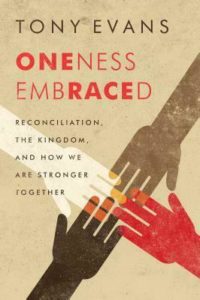
Receive Tony Evans' book Oneness Embraced for your donation of any amount!

Visit our online store and purchase a CD of today's program for yourself or to share with a friend.
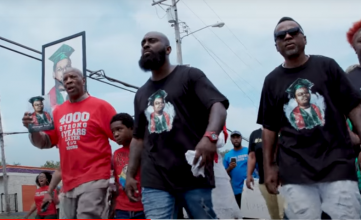
Visit the website for Dr. Shelby Steele's documentary film "What Killed Michael Brown?" which examines race relations in America with a focus on the 2014 shooting of a black teen, Michael Brown, in Ferguson, Missouri.

NFL tight end Benjamin Watson discusses the prejudices common to all people as a result of our environment and experiences, and offers his insights on how we can ease racial tension in our society. (Part 1 of 2)

Captain Ronald Johnson of the Missouri Highway Patrol (retired) discusses the hostile racial tension that followed the Aug. 14, 2014 fatal shooting of Michael Brown, and his efforts to restore peace between the African American community and law enforcement. (Part 1 of 2)

We have a limited capacity that will only expand as we choose to be curious about racial inequality, rather than assuming we get it.

It's not hard to see how race-based discrimination is a direct assault on the sanctity and dignity of human life.

Don't allow the enemy to win in his quest to maintain racial division and suspicion, especially in the body of Christ where it has no place.
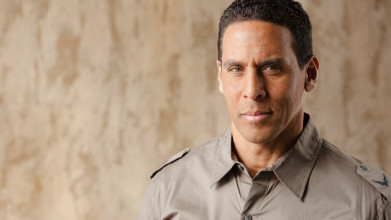
Miles McPherson argues that we must learn to see people not by the color of their skin, but as the Lord sees them – human beings created in the image of God.
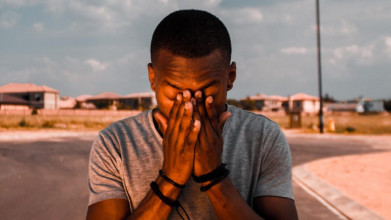
To my black friends: How can I best hear you right now? How can I best love you right now? What do I need to know that I'm not "getting" right now?

Dr. Lainna Callentine became aware at age six that her skin was a different color than other kids in class. Get her unique perspective on how we, as Christians, should talk to our kids about racial differences.
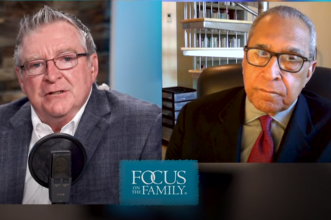
Jim Daly and Dr. Shelby Steele discuss how the Founding Fathers and men like Abraham Lincoln and Martin Luther King Jr. paved the way for African-Americans to enjoy freedoms they deserved all along.

This discussion offers a preview of Volume #16 “Cultures in Conflict” from the That The World May Know video series, available below.

Debra Fileta will help couples better understand the four seasons of healthy relationships, what to expect during each one, and how to carefully navigate them for a stronger marriage. (Part 1 of 2)
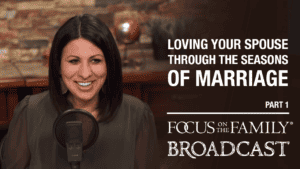
Debra Fileta will help couples better understand the four seasons of healthy relationships, what to expect during each one, and how to carefully navigate them for a stronger marriage. (Part 1 of 2)

Larnelle Harris shares stories about how God redeemed the dysfunctional past of his parents, the many African-American teachers who sacrificed their time and energy to give young men like himself a better future, and how his faithfulness to godly principles gave him greater opportunities and career success than anything else.

Amy Carroll shares how her perfectionism led to her being discontent in her marriage for over a decade, how she learned to find value in who Christ is, not in what she does, and practical ways everyone can accept the messiness of marriage and of life.

Jonathan McKee offers parents practical advice and encouragement in a discussion based on his book If I Had a Parenting Do Over: 7 Vital Changes I’d Make.